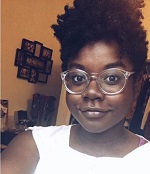Taking Space
On a typical school night, I’m usually texting my friends about Bravo reality television, and catching up on some major assignment that I’ve procrastinated on. Last week I was working on a major assignment, and couldn’t find the page count needed. Stressed out once again, I fought back tears as I struggled to finish the assignment. After a dramatic 30 minutes of me crying over school, I decide to look over the rubric one last time. The fog of stress had lifted, and I could clearly see that the assignment was to be no more than five pages. So why was I having such an intense emotional reaction to making such a simple mistake?
I think the reason is that I’ve been alive for 22 years, and only truly thought that I was smart and capable for two of them.
Growing up, I had access to a great education. My parents sent me to a private Catholic school from the ages of five to twelve. In school, I was often the fastest reader. My classes were small, and I was able to chart my progress with others in my grade. However I struggled with math, and still do to this day. While access to this education was amazing, what this school held in uniform and discipline, it lacked in diversity. I was frequently the only Black girl in class, a fact that I grew used to.
Moving from Georgia to Michigan at the age of 12 was rough. It’s when I truly believe I first became depressed. Once again, I was in honors classes. I made good grades in middle school, but I was constantly sad. Middle school is an awkward time for anyone, but the microagressions of being in an predominately White class weighed down on me. If I had to sum up my experience in middle school, I think the phrase “you don’t belong here,” would be accurate.
In High School, I could no longer fake being happy. I had a C average after my first semester simply because I was too sad to apply myself. I forgot that high school even had GPAs until my smug friend told me freshman year. While in some friend groups this isn’t the end of the world, to me it was. Once again one of the only Black girls in my classes, I felt as though I had to hide this secret. When my classmates asked my GPA or class rank, I often lied or changed the subject. These feelings of shame followed me to college where I bounced from major to major. Previously a pre-nursing major (with a good GPA) I changed my mind due to too much competition and self doubt. Still depressed and unsure, If I ever felt confused I was too afraid to ask.
I think the moment I realized I was smart, was the moment that I realized that formal education had no correlation with the concept of smartness. It’s when I realized that smartness, as a concept, is subjective. Often based on standards fueled by White supremacy and ableism, the standards we use to define knowledge are strict and narrow. We often define smartness, by succeeding in traditional American schooling. But who creates the content? Who has access to the tools? Who is aided in their search for perfection, and who is discouraged? Why does any of this matter?
The more I questioned who defined smartness, the more I grew into my own. This wasn’t an easy process. I had my own stuff to work through. I needed to realize that the same care I extended others, needed to also be extended to myself. In the real world, I knew it didn’t matter if you attended college. I knew that grades were relatively irrelevant. However, once I stepped into the academic world, I immediately started attributing value to these things again. The moment I realized I was smart, and experienced a dramatic shift in the way I viewed myself, was when I became an organizer. My confidence significantly improved when I intentionally sought out community that looked like me. Seeing other Black femmes in leadership roles, daring to dream and live fearlessly empowered me to feel as though not only did I deserve to be in every space, but that my background and skills added value to every space that I entered. Being a Black femme gives me access to so much knowledge, community, and wisdom. It shapes how I move in the world, and how I see myself in it.
As for now, I’m still working through the years of insecurity, but I’m in a much better place. Clearly, sometimes I still fumble. Different things bring me back. Sometimes a passive aggressive comment that I’ve benefited from affirmative action. Friends explaining content to me that I didn’t ask for. Feeling ignored and unheard in academic settings. Debating applying to grad schools because of a fear of rejection.
I don’t think there’s a problem with having insecurities. I think power comes from naming these insecurities and striving to work through them. I work through these everyday. I demand access to these spaces. I deserve access to these spaces. When I don’t feel heard in these spaces, I work to create my own.

Major: Human Services with an Emphasis in Non-Profit Administration Hometown: Kennesaw, Georgia Favorite Writer: I’m going to be honest, I don’t read as many books …
More By This Author

